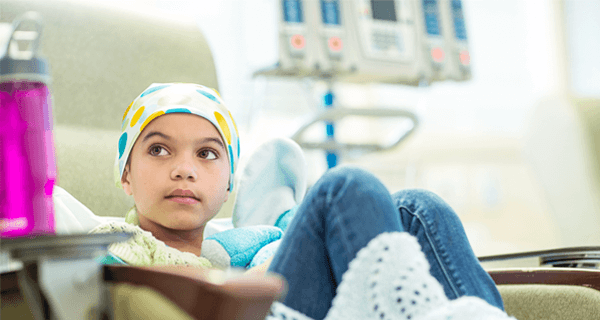Blog
Supporting your family through a cancer diagnosis in the midst of a pandemic
19 June 2020

As a parent coping with a cancer diagnosis, it can be a delicate act trying to manage your own emotional response while being the primary source of support for your children. Dealing with cancer in a COVID-19 world is unfortunately only going to make parenting tougher. It is common for parents to feel guilty about the impact cancer has, and COVID-19 has made it challenging for young people to access their life outside of cancer, which has increased pressure on parents.
Fortunately, we understand the unique situations faced by Australian families going through cancer right now, and have teamed up with youth cancer organisation, Canteen, to capture some expert insights on this topic. Here, Sandy Cham, General Manager of Division at Canteen provides her useful tips for supporting the family through a cancer diagnosis.
Q: When should I talk to my children about a cancer diagnosis?
A: Talking to your children about your cancer diagnosis might be one of the most difficult things you will ever have to do. Initially, your instincts might be to keep the news from them, but children can work out quickly that there is something wrong. While it may seem overwhelming, it is important to start this conversation as soon as you understand the information that you have and feel emotionally able.
Q: How can I prepare to talk about it?
A: Be as ready as you can be before you start the conversation with your children. Consider how you will tell them, use simple language, and try to avoid overloading them with too much detail. Try and ask questions to establish their level of understanding to help you adjust your explanations to their level, and ensure you correct any misunderstandings.
Q: What do they need to know?
A: The information you provide to your children will depend on their age, how much they can understand and what they want to know. Your children will need to know the type of cancer you have, the treatments you will have and for how long, any side effects you may experience (i.e., hair loss) and how cancer will affect them and change family life. It is also important that you let them know that you will update them with any information or changes and that your cancer has nothing to do with anything they did, said, or thought.
Q: What if they can’t visit a family member with cancer?
A: There may be times where it is not safe for a family member with cancer to receive a face to face visit, especially during the current pandemic. Make sure that your children still feel connected to their family member and are able to show that they care. This could include; changing phone calls to video calls, holding family meals via group video chat, sending something meaningful through the mail, singing and playing music together via video chat, reading to the person – whether that be by sending an audio file or using video chat, or watching a movie together through Netflix party.
Q: My kids are at home and feeling extra stressed. What are ways to ease their anxiety?
A: It is normal for your children to be feeling stressed and anxious as a result of COVID-19, particularly when a family member has a cancer diagnosis. To try and ease this anxiety, maintain normal family routines where you can, ensure they have other adults who they can discuss their feelings with, connect them with other children who understand what they are going through, and encourage them to do regular things like seeing friends (even if it is only virtually for the moment), so they get “time out” from cancer.
Q: How can I get extra support if I need it?
A: Canteen’s Psychosocial Support Workers offer therapeutic, evidence-based interventions to young people and parents. This support is currently delivered via phone and zoom sessions. There are also options for young people to virtually attend programs which are specifically designed to give young people a break from cancer by engaging in fun group activities. Young people and parents can also access support online through Canteen Connect, where they can talk to trained counsellors by phone, email or live chat, or engage with others in a similar situation via live chat, blogs and discussions boards.
Extra tips on supporting your family through cancer during COVID-19
It is important to take care of yourself, involve your children in what’s going on and ensure they know they are loved and feel supported. We all need extra help from time to time, it is vital to be able to recognise when external support would be useful and reach out to those organisations who can do this.
If you have further questions on this topic, or need any further support, here are some helpful resources:
- Canteen Connect: Online community for young people and parents affected by cancer
- Cancer Council: Call 13 11 20 for support and information for anyone affected by cancer
- Lifeline: Call 13 11 14 for 24-hr crisis support and suicide prevention services
- Kids Helpline: 1800 55 1800 for 24/7 phone counselling for young people
Tags
